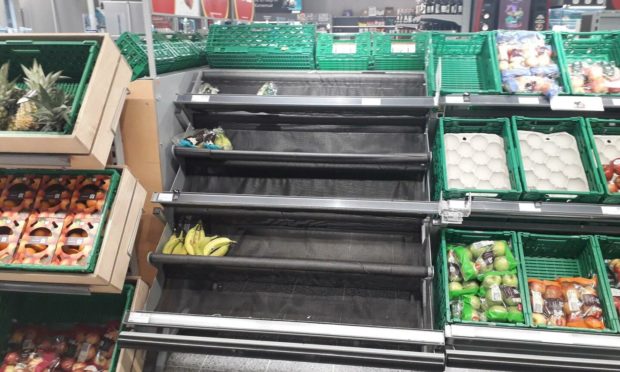It wasn’t on the scale of a Cold War Eastern Bloc country where women wearing woolen head scarves scanned the shelves of shops in search of an onion or a couple of tatties, but the supermarket I visited this week was alarmingly low on many items of fruit.
If we heed what is being said by leading retailers like Tesco, Asda, Morrisons, Sainsbury’s, Aldi and Lidl, this could be a taster of what’s to come.
The NHS Covid-19 app, available in England and Wales, is at the root of the problem, apparently, “pinging” the smart phones of those at risk from coronavirus.
“The faster you know,” says the NHS (Not Here in Scotland) website, “the quicker you can alert and protect your loved ones and community, helping to stop the spread of the virus.”
It means that too many long distance lorry drivers, the ones who bring perishable and other foodstuffs to your favourite supermarket, are being “pinged” and told to take to their beds. So, in just a few weeks, you could be grappling with that woman in the woolen head square and wellies about a packet of Daz or a bunch of bananas.
The posher supermarkets, of course, would probably witness a bit of face scratching and hair pulling over the last pack of couscous or that solitary fennel bulb for the seafood linguine.
Meanwhile, their partners will be doing battle in the toilet roll aisle over the number of nine-packs they’ve squeezed into their trolley in the event a black market opens up in the coming days and weeks.
Who will load the shelves, even if the food is delivered?
Yet, we must take seriously the warning from Richard Burnett, chief executive of the Road Haulage Association, who told BBC Radio 4’s Today programme that the country is “facing a collapse” of the food chain. All right, he didn’t mention toilet roll, but that, too, will surely come on to the “at risk” list.
Businesses, including supermarkets, have an increasing number of staff self-isolating, which exacerbates the problem
There will, according to Mr Burnett, be even bigger gaps on the shelves and while he apportions blame to Boris’s government, if there is a dearth of drivers south of the border it will impact on Scotland.
Businesses, including supermarkets, have an increasing number of staff self-isolating, which exacerbates the problem. Who will load the shelves, even if the food is delivered?
That last sentence could be the opening voiceover for a Netflix drama series. I’m off to start writing it.

